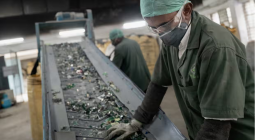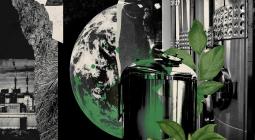UK student invents repairable kettle that anyone can fix
Gabriel Kay hopes his design can help tackle the problems caused by discarded electrical goods
Gabriel Kay really understands his target audience. As a student of industrial and product design at De Montfort University, he focused on the kettle.
“Everyone can relate to a kettle, right?” says the 22-year-old graduate. “It’s easy to understand and associated with comfort. It’s a friendly introduction to design.”
The vital difference between Kay’s kettle and the one in your kitchen is that his design – the flamboyantly named Osiris – is repairable. Its removable electronics can be replaced by anyone with a screwdriver.
“Obviously I wouldn’t advise anyone to go digging into typical electrical products due to safety standards and warranties,” says Kay, “but I believe anybody is capable of carrying out maintenance and understanding how their products work. Osiris separates the potentially hazardous components, turning the process into something more like changing the dust bag in your vacuum than repairing an item.”
If you think this sounds like an excellent idea, you are not alone. Osiris has won awards from De Montfort University and the graduate showcase New Designers.
Kay has also been brought on to the Green Grads programme. This platform was founded in 2021 by design editor Barbara Chandler as a way of promoting new UK graduates “with ideas to heal the planet”. Their designs appear in exhibitions and at events – including an upcoming show at Yorkton Workshops, London, next weekend, which will feature Kay’s kettle alongside a shoe that can be adapted for different terrains designed by Lewis Broughton, a new biocomposite made from rice straw, invented by Yohaan Kukreja and Ankita Khanna, and Conor McArthur’s seaweed “leather”.
Chandler says: “Our graduates tackle issues from new biomaterials to energy reduction. But repair – and its bedfellow durability – are vital strategies for cutting waste, infinitely better than recycling. According to the EU, 80% of consumers would like repairable goods. But repairs need to be easy and reassuring. Gabriel’s kettle focuses on that. You never see any scary internal electrics. Materials are robust; it looks good and works well.”
E-waste – discarded electrical goods – is becoming an urgent problem. According to the UN’s fourth Global E-waste Monitor (GEM), the generation of electronic waste is now rising five times faster than recycling efforts. The report also predicted a drop in collection and recycling from 22.3% in 2022 to 20% by 2030 due to the rapid growth of e-waste.
Despite this, many products are designed so that they cannot be repaired. Efforts to mend broken electrical goods can void the warranty. Right to repair legislation in the UK was introduced in 2021 but it’s described as “manifestly inadequate” by Chandler. In 2020 the UK was the world’s second largest producer of e-waste per capita according to GEM. E-waste is often dumped in countries in the global south – Ghana is home to one of the world’s largest e-waste dumps.
The Osiris kettle is named after the Egyptian god of death, rebirth and resurrection, and Kay hopes his product will live up to its title.
He says: “Consciousness is everything. Understanding how long your products should last against the years of use they get is key. Awareness of our effect on waste and using products to their full lifespan can help us mitigate our effect on this crisis.”
The Osiris has not yet found investment, though it may be just a matter of time. There is growing interest in repairable electrical goods, and increasing numbers of successful green startups such as the smartphone maker Fairphone – which became profitable in 2020 – and Suri, which reached sales of more than £10m with its repairable, recyclable toothbrush in 2023.
Kay says: “I think in the future, as regulations make right to repair a standard practice, there could be a perfect market for a product like this.”
Cover photo: Osiris, a kettle that can be repaired with a screwdriver





